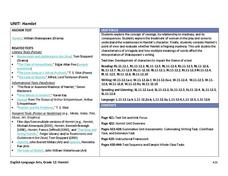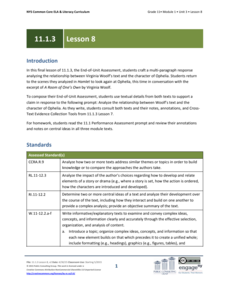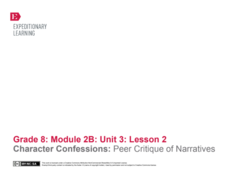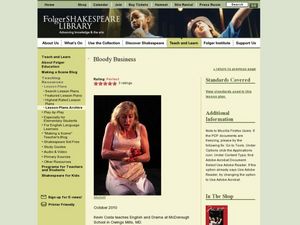Louisiana Department of Education
Unit: Hamlet
Encourage readers to determine if Hamlet's madness is actually divinest sense. Class members analyze the words of the play before studying related texts, including T.S. Eliot's "The Love Song of J. Alfred Prufrock," scenes from...
US Mint
Rename That State!
As Shakespeare famously wrote, "A rose by any other name would smell as sweet," but can the same be said for a state? In this elementary geography lesson, students are assigned specific states to research using the information they find...
Literacy Design Collaborative
Whom Do We Trust, and Why?
Is it possible to regain trust? Scholars put much thought into the subject of trust after reading Shakespeare's Macbeth. Readers work together to analyze how the character relationships develop the a message about trust. They then create...
EngageNY
Grade 11 ELA Module 1: Unit 3, Lesson 8
How does the theme of gender inequality develop in Virginia Woolf's A Room of One's Own and Shakespeare's Hamlet? Pupils craft a multi-paragraph response to analyze the relationship between the texts. They use evidence from both works to...
EngageNY
Grade 11 ELA Module 1: Unit 3, Lesson 7
How might two completely different texts address similar topics and themes? Using the penultimate instructional activity from the eight-part Grade 11 ELA Module 1: Unit 3 series, scholars review the central ideas they developed in a...
EngageNY
Mid-Unit Assessment: Justification for Character and Scene Selection
When it comes to love and midsummer nights, confessions are tricky. Learners place themselves in the shoes of a character from William Shakespeare's A Midsummer Night's Dream and explain how a character manipulated another character in...
EngageNY
Character Confessions: Peer Critique of Narratives
Shake up the writing process with a peer critique. The second of four lessons in the Grade 8 ELA Module 2B, Unit 3 series first has young writers compare their interpretations of a scene from William Shakespeare's A Midsummer Night's...
Anti-Defamation League
Should Washington's NFL Team Change Their Name?
"What's in a name?" Is it irrelevant, as Juliet suggests in Shakespeare's play, or is nomenclature deeply significant? Young scholars weigh in on the debate by examining the controversy over the NFL's Washington, D.C. Redskins. Groups...
Curated OER
Julius Caesar: Fate Versus Free Will
Tenth graders engage in a study that is about Julius Caesar while reading a play. The role of the main character is examined while looking for motive and tension presented by Shakespeare. They write a summary and critique of the play.
Curated OER
HAMLET HOOK
High schoolers their personal reactions to issues of family relationships in light of the the plot, characterization, and themes of the play. They analyze the characters of Hamlet on an emotional level not just intellectual.
Curated OER
The 32-Second Macbeth
Students read a very short script synopsis of Macbeth. They read the script, in small groups, trying to break the 32-second record, then write their own 32-second versions of one act from Macbeth.
Curated OER
Bloody Business
Students research word frequencies in Macbeth and create a frozen picture inspired by a word. In this Macbeth lesson plan, students view Blood Will Have Blood and discuss the dual meaning of the word "blood." Students identify five...
Curated OER
"Words, words, words"
Students discuss words that represent the "big ideas" in Othello and that recur throughout the play. They will be assigned words to track throughout the text, recording which character says the word and in what context.
Curated OER
Get Thee To Wife!
Students read and analyze a piece of literature from 1591 to investigate whether Elizabethan fathers were patriarchal dicatators. Students read the passage and answer questions to determine what fathers were like during the late...
Curated OER
"Say you will be mine": Unspoken Answers and Unscripted Scenes
Students hypothesize the content of unscripted moments and responses, search for evidence in the actual text to support their hypothesis, and explore how this hypothesis would affect characterization. Groups perform their scenes and...
Curated OER
Color Coding Richard III
Tenth graders use color-coded annotation or text-marking to analyze a passage from Richard III. In this text analysis lesson, 10th graders read a passage from Richard III and use colored pens to analyze the text. Students then devise a...
Curated OER
Who is Gertrude, Really?
Students form opinions about Gertrude by imaginatively creating 5 entries for Gertrude's journal. Each journal entry reveal much about Gertrude's character at pivotal moments in the play.
Curated OER
The Secret life of Minor Characters
Students read Julius Caesar line by line. They discuss what is going on in a particular scene. Each student in a group takes the role of an assassin and comes up with a clear characterization and motivation. They share and watch within...
Curated OER
NOTHING TO LEAR BUT LEAR HIMSELF
Students read a scene from King Lear and decide collaboratively how best to present it. In doing so, they examine the scenes and the play from multiple perspectives.
Curated OER
O, LEAR'S MANY REASONS
Young scholars analyze King Lear's speech and identify his "darker purpose", and let them explore different styles for reading it aloud. They can perform the scene as well.
Curated OER
Macbeth: What's Up with the Crime Scene?
High schoolers are introduced to Macbeth by having them act out the scene where Duncan's murder is discovered. This activity enable students to use dialogue only to discover the structure and format of a scene and explain plot.
Curated OER
Welcome to Venice
Students read the opening scene of the play, The Merchant of Venice without receiving any background information. They analyze and discuss the relationships between the six characters, and determine the social status of the characters.
Curated OER
Guess that Scene: A Review of A Midsummer Night's Dream Through Performance
Students rewrite and perform various scenes from the play, A Midsummer Night's Dream. In groups, they include the main quotes and ideas from their scene, perform it for the class, and identify which scene each group is performing.
Curated OER
Where Do They Stand?: Perspectives on Othello's Marriage
Students read and discuss Act one, scene three of the play, Othello. They examine the text in small groups, determine each character's attitude toward Othello, identify text to justify their conclusions, then recite lines to the class.
Other popular searches
- William Shakespeare
- Shakespeare Sonnets
- Shakespeare in Love
- Rhyming Couplets Shakespeare
- Shakespeare in Love Film
- Shakespeare and Macbeth
- Esl and Shakespeare
- Shakespeare Phrases
- Shakespeare Activity
- Shakespeare Acting
- Shakespeare Julius Caesar
- Shakespeare Lesson Plans

























